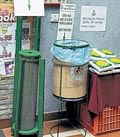
The good news is that the institution has also adopted a well-planned series of measures aimed at reducing their carbon footprint on the environment.
From water recycling to rainwater harvesting, from banning the use of plastic wherever possible, planting trees and switching to energy saving devices, the present managing committee has also launched an intensive campaign to raise the collective consciousness of its members to become more aware and proactive with regard to environmental and ecological issues.
The message is sent out through various methods and at many different levels from car stickers, to table-top coasters, from strategically placed recycling bins that catch your eye to the latest in recycling technology — Save the environment and save the planet.
“Operating a green club is not only good for the environment but also makes good business sense simply because conserving resources and cutting down on waste saves money,” says Club Secretary Col Murthy.
The Club is already geared towards rainwater harvesting and the existing wells are thus being systematically recharged.
“We use rainwater as an alternative water source as it conserves municipal and well water, is obviously free and the gravity-fed systems that it operates on conserve energy. Conserving energy is also one of our top priorities and to that end, we have replaced incandescent bulbs in 80 percent of the club with CFL energy-saving bulbs.
Electrical geysers in the guest rooms and the health club have been replaced by solar water heaters and I’m pleased to say that they are working really well,” adds Murthy.
Recycling is the first thing that comes to mind when we think of being environmentally-friendly and the Club has adopted a large-scale recycling system put into place and operated by recognised NGOs.
“We segregate our wet and dry waste everyday. The wet garbage is scientifically turned into compost and manure which we use in our gardens and sell the surplus which is neatly packed to our members at a nominal amount.
This year the managing committee has made a strong commitment to environmental issues and I’m happy to say many of our plans have already successfully been implemented. We have banned the use of non-biodegradable plastics at all locations and installed conveniently located drop off points for the collection and recycling of e-waste, used CDs, batteries etc. We are also in the process of installing a plant to recycle swimming pool and laundry waste water too,” says Kumar Subramanium, the President of the Club.
Deccan Herald is on WhatsApp Channels| Join now for Breaking News & Editor's Picks